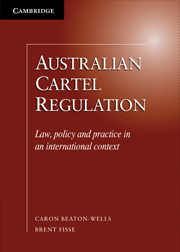Book contents
- Frontmatter
- Contents
- About the authors
- Preface
- Acknowledgements
- Abbreviations
- 1 Introduction
- 2 The legal framework governing cartel conduct
- 3 Collusion (contracts, arrangements, understandings)
- 4 Cartel and other provisions
- 5 Fault elements of the cartel offences
- 6 Individual liability for cartel conduct
- 7 Corporate liability
- 8 Exceptions
- 9 Enforcement policy
- 10 Immunity and cooperation policies
- 11 Sanctions
- 12 Compliance and liability control
- 13 Conclusion
- Appendix Trade Practices Act 1974 (Cth) Pt IV Div 1; Pt IV Div 2 s 45
- Index
3 - Collusion (contracts, arrangements, understandings)
Published online by Cambridge University Press: 05 December 2011
- Frontmatter
- Contents
- About the authors
- Preface
- Acknowledgements
- Abbreviations
- 1 Introduction
- 2 The legal framework governing cartel conduct
- 3 Collusion (contracts, arrangements, understandings)
- 4 Cartel and other provisions
- 5 Fault elements of the cartel offences
- 6 Individual liability for cartel conduct
- 7 Corporate liability
- 8 Exceptions
- 9 Enforcement policy
- 10 Immunity and cooperation policies
- 11 Sanctions
- 12 Compliance and liability control
- 13 Conclusion
- Appendix Trade Practices Act 1974 (Cth) Pt IV Div 1; Pt IV Div 2 s 45
- Index
Summary
Introduction – the law in flux on collusion
In Australia, the notion of collusion between competitors is encapsulated in the concepts of ‘contract’, ‘arrangement’ and ‘understanding’. These concepts have been present in the civil prohibitions on cartel conduct, under s 45(2) of the TPA, since 1974. There is now a substantial body of case law on their meaning, as well as a growing body of literature. However, in many respects and certainly by comparison with overseas jurisdictions, the law on this threshold element of cartel conduct is undeveloped and unsatisfactory. The same concepts are used in the cartel offences in ss 44ZZRF–44ZZRG and civil per se prohibitions in ss 44ZZRJ–44ZZRK introduced in 2009 by the CC&OM Act. Notwithstanding s 44ZZRE, which purports to ‘“immunise” the remainder of the TP Act from the meaning of terms used in Div 1 of Pt IV’, it is presumed that courts will adopt the same interpretation of the concepts for both the offences and the civil prohibitions.
In 2007, the ACCC recommended amendments to the TPA in connection with the interpretation of an ‘understanding’, in the wake of its partly unsuccessful cases against petrol retailers for alleged price-fixing in Ballarat (Apco) and Geelong (Leahy) and its subsequent petrol pricing inquiry. Each of the aspects of these proposed amendments is discussed in detail below. Broadly speaking, the proposals should be regarded as misconceived, problematic and, to a significant extent, symptomatic of a failure to grapple with the fundamental issues. The government announced that it would give the proposals ‘careful consideration’ and the Treasury subsequently released a Discussion Paper seeking submissions ‘regarding the adequacy of the current interpretation of the term “understanding” in the TPA to capture anti-competitive conduct’. The Discussion Paper was also deficient, not only in its omission of any reference to arguments for and against reform, but also in its failure to raise for consideration approaches alternative to those advocated by the enforcement agency. The problems complained of by the ACCC have been the subject of detailed examination in other jurisdictions. Yet this extensive overseas experience does not appear to have been drawn on, either by the ACCC or Treasury in relation to the 2007 proposals. With one exception, the submissions received by Treasury were opposed to the proposed amendments.
- Type
- Chapter
- Information
- Australian Cartel RegulationLaw, Policy and Practice in an International Context, pp. 36 - 74Publisher: Cambridge University PressPrint publication year: 2011

